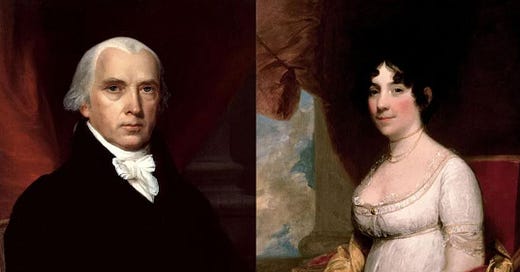See the rest of this series on Pop Culture Presidents.
James Madison was the Father of the Constitution, a pretty hefty claim for someone who was 5’4”, 100 pounds, and appeared to be soft spoken, modest, weak, and nervous. Not to mention a fairly bad president.
Prior to being elected the fourth president in 1809, he had spent nearly 30 years actively involved in national politics, mostly creating, reforming, and ratifying the Constitution with the states.
Perhaps all that policy and law over the years trimmed down some of his rougher edges because, while still having a modicum of “pop culture” left in him, Madison was one of our tamer sex, drugs, and rock n’ roll presidents.
Sex
Madison was a bachelor until the ripe old age of 43, although he had several female attractions along the way, including “a teenager half his age (who jilted him) to a wealthy widow of a Tory merchant,” notes the Smithsonian. But when he saw the future Dolley Madison Todd on the street one day in Philadelphia, he was instantly smitten. He discovered his friend Aaron Burr had a connection to her, Burr introduced them, and they were soon married. While he seemingly remained timid to most people, she offered a good balance with her hearty eating, gambling, and general carousing.
Drugs
Behind his timid and sometimes harsh and craggy exterior, Madison was actually quite festive. At the couple’s dinner parties, he would bring out the wine early and it would typically stay out late.
Along with the wine, Madison allegedly drank a pint of whiskey many or most days, which would obviously qualify him as an alcoholic by current standards. And although it may not be as much fun as all that whiskey, he also was a hemp farmer.
Rock n’ Roll
“Through most mealtimes, he maintained a steady stream of anecdotes and stories. Friends relished his wicked sense of humor.” So as we see, the Madison household was not the quiet and philosophical place one might expect from one of the most learned presidents.
Policy
Despite an almost boyish frailty, Madison does lay claim to being the only president to ever take part in serious field combat, in the battle of Bladensburg. This is something modern-day residents of Washington D.C. might think of only as a major arterial street through the Nation’s Capitol but it was actually a fight that resulted in America losing and giving up unimpeded access to D.C. to the British. At that point, if the British had wanted to and not been so exhausted from their battling with the French, they very well could have tried to reverse the results of the American Revolution and taken back ownership of the U.S.
Although there weren’t necessarily winners or losers in the War of 1812 between the U.S. and UK, Madison did come out of it looking pretty good, having not used his executive power excessively and thus tamping down what could have been a much bigger war.
In later years, after his presidency was over, he wrote extensively and philosophically about being proud of keeping the Constitution and Union in tact through tumultuous times. He also wrote about how the new country should be wary of slavery, “which was promoting a new and disturbing form of sectionalism.” This was a noble thing to write, if only he somehow could have avoided having 36 taxable slaves at the time of his death. Never while he was alive or in his will did he free any slaves.
Some of his other major and mixed-bag policy efforts in office included enacting the Tariff of 1816 to promote American industry, expanding U.S. territory by acquiring 26 million acres of land from Native American tribes through treaties and war, and negotiating a commercial convention with Britain in 1815 to help grow the U.S.'s role in international trade.





